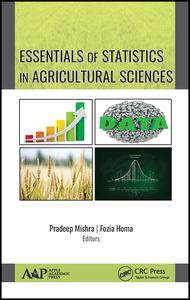

Most ebook files are in PDF format, so you can easily read them using various software such as Foxit Reader or directly on the Google Chrome browser.
Some ebook files are released by publishers in other formats such as .awz, .mobi, .epub, .fb2, etc. You may need to install specific software to read these formats on mobile/PC, such as Calibre.
Please read the tutorial at this link: https://ebookbell.com/faq
We offer FREE conversion to the popular formats you request; however, this may take some time. Therefore, right after payment, please email us, and we will try to provide the service as quickly as possible.
For some exceptional file formats or broken links (if any), please refrain from opening any disputes. Instead, email us first, and we will try to assist within a maximum of 6 hours.
EbookBell Team

4.3
38 reviewsAn understanding of the basics, logic, and theory of statistics is essential for agricultural researchers for dealing with the interpretation of data. This volume presents some of the basic and necessary concepts of statistical tools, specifically as applied to the statistics of agriculture and allied fields. It covers basic statistics, design of experiments, sampling techniques, time series, inference outlines, forecasting models, data handling, and statistical software in an easy-to-understand manner that is aimed at students and researchers with little or no mathematical background.
In the agriculture scenario, students and researchers face problems that can be addressed with statistical tools, planning of field experiments, collection of data, analysis, interpretation of the data, etc. In this book, statistical theories are discussed with the help of examples from real-life situations in agriculture and allied fields, followed by worked-out examples. Each chapter is followed by a number of problems and questions that will help readers gain confidence in solving those problems. The volume also provides an analysis of how data is important and introduces the reader to using statistical software such as MS Excel, SAS (Statistical Analysis System), JMP, Minitab, and R (from the R Foundation for Statistical Computing).